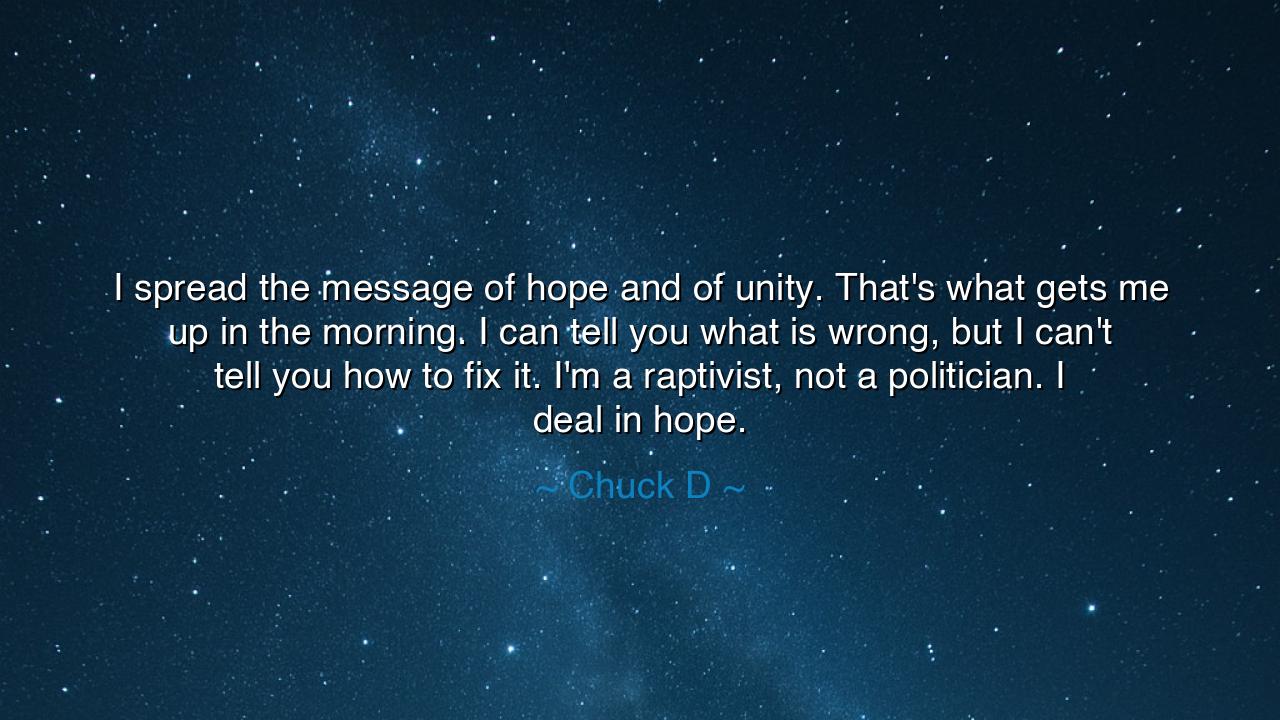
I spread the message of hope and of unity. That's what gets me up
I spread the message of hope and of unity. That's what gets me up in the morning. I can tell you what is wrong, but I can't tell you how to fix it. I'm a raptivist, not a politician. I deal in hope.






The words of Chuck D — “I spread the message of hope and of unity. That’s what gets me up in the morning. I can tell you what is wrong, but I can’t tell you how to fix it. I’m a raptivist, not a politician. I deal in hope.” — rise like a drumbeat through the noise of the modern age. They are the words of a man who has stood in the crossroads of art and struggle, who knows that his power lies not in decrees or laws, but in words, rhythm, and truth. In this declaration, Chuck D — the legendary voice of Public Enemy — defines the ancient role of the artist as messenger, prophet, and awakener of the human spirit. His tools are not swords or policy, but the voice that calls people to remember who they are. His trade is hope, his weapon is truth, and his duty is to unite.
To understand this quote, one must first understand the man and the movement from which it was born. Chuck D emerged in the 1980s, when hip-hop was not yet the vast industry it would become, but a raw and urgent cry from America’s streets. His words were forged in the fires of inequality, racism, and political neglect. Yet he did not descend into bitterness; he transformed anger into awakening, frustration into focus, and despair into defiance. When he calls himself a “raptivist” — a fusion of rapper and activist — he reminds us that art is not merely entertainment, but a sacred duty to speak truth to power, to stir the sleeping hearts of men, and to call them toward justice and unity.
His confession — “I can tell you what is wrong, but I can’t tell you how to fix it” — is not an admission of weakness, but an act of humility. It acknowledges that the artist’s role is not to govern, but to awaken conscience. The prophets of old — from Isaiah to Socrates — spoke not to command armies, but to awaken souls. They were not lawmakers, but truth-tellers, who reminded the people of what they had forgotten: their capacity for goodness, for solidarity, for compassion. Chuck D stands in that lineage. His mission is not to prescribe solutions, but to ignite the fire in others to seek them. He knows that hope, once kindled, becomes its own teacher — that a people awakened to their own dignity will find their own way forward.
In this, his message mirrors that of the ancient poets and philosophers, who understood that the spoken word can shape the destiny of nations. The Greek dramatists used the stage to reveal the moral sickness of tyranny and the strength of the human soul. The Hebrew psalmists sang songs of sorrow that became hymns of resilience. The griots of Africa carried history through song, binding generations together in memory and identity. Chuck D, through the rhythm of rap, continues that ancient lineage of storytellers who refuse to let despair have the last word. His art is both rebellion and reconciliation — rebellion against injustice, and reconciliation with the belief that humanity can rise above it.
To “deal in hope” is no easy thing. Hope is not blind optimism, nor the denial of pain; it is the courage to look upon suffering and still say, “There is a way forward.” In the darkest times of history, it is hope — not fear, not violence — that has saved civilization from collapse. Consider the work of Nelson Mandela, who emerged from twenty-seven years of imprisonment not with vengeance, but with forgiveness and vision. He, too, dealt in hope. Or think of Martin Luther King Jr., who stood before hatred and declared that love was still the mightier force. These men, like Chuck D, were not politicians alone; they were voices of unity, artists of the soul who painted their dreams upon the conscience of humanity.
There is a lesson here for all who hear his words: you may not have the power to change the world’s systems overnight, but you have the power to change its spirit. You may not hold the pen that writes the laws, but you hold the voice that speaks the truth. To be a raptivist in one’s own way is to live awake — to use your own gifts, however small, to inspire others, to bring healing where there is division, to bring light where there is confusion. Each person, in their own sphere, can become a bridge, a healer, a messenger of hope.
Thus, let this teaching endure: the true measure of power is not dominance, but influence through compassion. The true artist, the true human being, does not demand that the world listen — he speaks because silence would betray his soul. Chuck D reminds us that in an age of cynicism, hope itself is an act of rebellion. To wake each morning with the desire to unite, to uplift, to remind others that we still belong to one another — this is the work of heroes, poets, and prophets alike.
So, carry his words within you: “I deal in hope.” For in the end, it is hope that outlives hatred, unity that outlasts division, and love — fierce, truthful, unyielding love — that forever rebuilds the world each time it falls apart.






AAdministratorAdministrator
Welcome, honored guests. Please leave a comment, we will respond soon